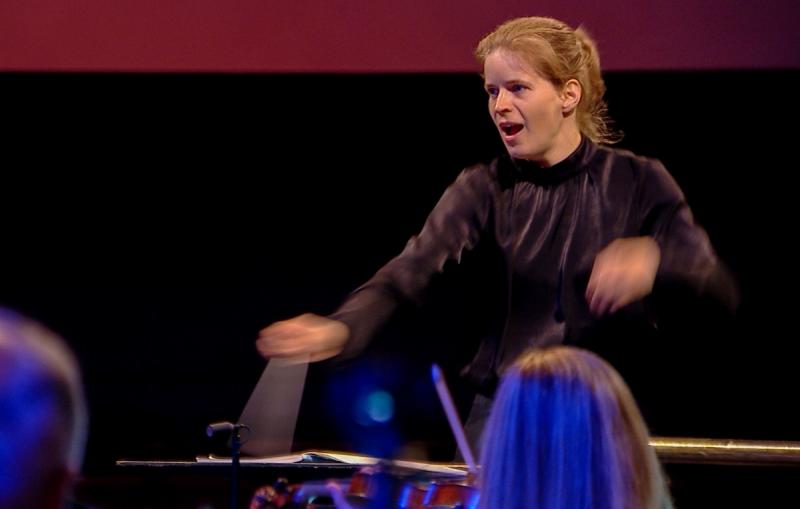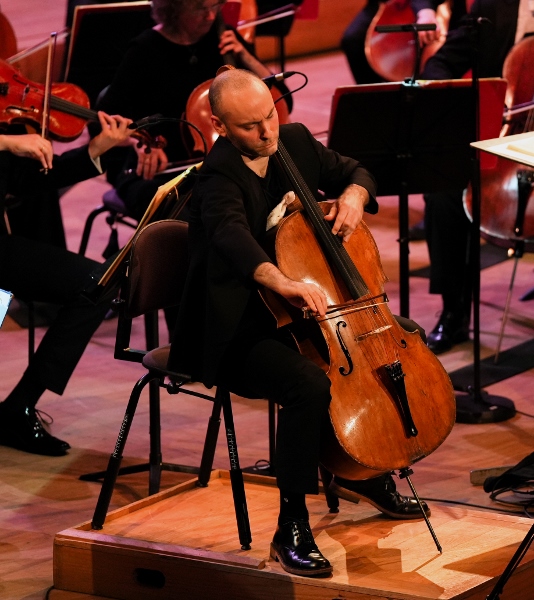Koranyi, Hallé, Berglund, Bridgewater Hall, Manchester review - beauty and joy | reviews, news & interviews
Koranyi, Hallé, Berglund, Bridgewater Hall, Manchester review - beauty and joy
Koranyi, Hallé, Berglund, Bridgewater Hall, Manchester review - beauty and joy
Cello soloist teamed with a former-cellist conductor for outstanding performance

It’s catching on … for the second consecutive night I heard an orchestra begin by playing, to a standing audience, the Ukrainian national anthem.
The outstanding performance of the evening came from a Swede, cellist Jakob Koranyi, in Dvořák’s Cello Concerto, wisely positioned as the opening event. With the brass well and truly off the leash in the big tutti passages, it made for a dynamically varied and rewarding performance, the soloist able to shrink his role to the merest murmur at times such as the close of the slow movement and towards the end of the finale. A feature of the concerto is the succession of duetting themes for cello with the orchestral wind soloists, and in that respect the Hallé has enviably gifted people in its ranks.
 Koranyi (pictured left) has a beautiful and rich tone (lots of D string soulfulness) ideally suited for the cantabile melodies that fill this work, and Berglund – herself a professional cellist in an earlier existence – made sure that his sound was audible against the full string numbers of the Hallé whenever it needed to be. Tabita Berglund kept the rhythms lively in the opening movement and lilting in the second, and didn’t forget that the orchestral celli have important moments of their own. The return to big orchestral gestures at the close of the whole piece can sometimes appear ham-fisted and jarring: here it did not, but simply affirmative and joyful.
Koranyi (pictured left) has a beautiful and rich tone (lots of D string soulfulness) ideally suited for the cantabile melodies that fill this work, and Berglund – herself a professional cellist in an earlier existence – made sure that his sound was audible against the full string numbers of the Hallé whenever it needed to be. Tabita Berglund kept the rhythms lively in the opening movement and lilting in the second, and didn’t forget that the orchestral celli have important moments of their own. The return to big orchestral gestures at the close of the whole piece can sometimes appear ham-fisted and jarring: here it did not, but simply affirmative and joyful.
There was a UK premiere to follow: This Too, by the Norwegian saxophonist, jazz band leader and composer known as Mette Henriette (real name Martedatter Rølvåg). It’s a very short piece – about five minutes – and something of an exercise in getting small sounds from a big orchestra, beginning with near-niente violas and harp and adding whispered percussion and breathy noises from the brass. It was written “during the height of the global pandemic” (funny how people talk about this as if it’s over) with the intention, in the composer’s words, of being something real and sincere for that time ... there was a sense of cold and loneliness, I thought, but I’m not sure it went very far beyond that.
Bartók’s Concerto for Orchestra made a real contrast. Written in wartime 1943 by a Hungarian who had fled his homeland (and there are signs of his longing for it in the music, as Tabita Berglund pointed out), it’s a wonderful display piece for musicians on their mettle and was directed with imagination and conviction.
Moments of passion flared up wonderfully in the first movement, with energetic brass playing, and lively articulation from the duetting wind players in the second. The central Elegia was the high point of the whole thing, as intended, with the strings (led by Hannah Perowne) on fine form, and the finale had both thoughtfulness and thrilling helter-skelter as it drove to its conclusion. Tabita Berglund’s conducting style – alert, encouraging and inspiring – seems to bring out exceptional music-making.
rating
Share this article
The future of Arts Journalism
You can stop theartsdesk.com closing!
We urgently need financing to survive. Our fundraising drive has thus far raised £49,000 but we need to reach £100,000 or we will be forced to close. Please contribute here: https://gofund.me/c3f6033d
And if you can forward this information to anyone who might assist, we’d be grateful.

Subscribe to theartsdesk.com
Thank you for continuing to read our work on theartsdesk.com. For unlimited access to every article in its entirety, including our archive of more than 15,000 pieces, we're asking for £5 per month or £40 per year. We feel it's a very good deal, and hope you do too.
To take a subscription now simply click here.
And if you're looking for that extra gift for a friend or family member, why not treat them to a theartsdesk.com gift subscription?
more Classical music
 Willis-Sørensen, Ukrainian Freedom Orchestra, Wilson, Cadogan Hall review - romantic resilience
Passion, and polish, from Kyiv's musical warriors
Willis-Sørensen, Ukrainian Freedom Orchestra, Wilson, Cadogan Hall review - romantic resilience
Passion, and polish, from Kyiv's musical warriors
 BBC Proms: The Marriage of Figaro, Glyndebourne Festival review - merriment and menace
Strong Proms transfer for a robust and affecting show
BBC Proms: The Marriage of Figaro, Glyndebourne Festival review - merriment and menace
Strong Proms transfer for a robust and affecting show
 BBC Proms: Faust, Gewandhausorchester Leipzig, Nelsons review - grace, then grandeur
A great fiddler lightens a dense orchestral palette
BBC Proms: Faust, Gewandhausorchester Leipzig, Nelsons review - grace, then grandeur
A great fiddler lightens a dense orchestral palette
 BBC Proms: Jansen, Royal Concertgebouw Orchestra, Mäkelä review - confirming a phenomenon
Second Prom of a great orchestra and chief conductor in waiting never puts a foot wrong
BBC Proms: Jansen, Royal Concertgebouw Orchestra, Mäkelä review - confirming a phenomenon
Second Prom of a great orchestra and chief conductor in waiting never puts a foot wrong
 BBC Proms: Royal Concertgebouw Orchestra, Mäkelä review - defiantly introverted Mahler 5 gives food for thought
Chief Conductor in Waiting has supple, nuanced chemistry with a great orchestra
BBC Proms: Royal Concertgebouw Orchestra, Mäkelä review - defiantly introverted Mahler 5 gives food for thought
Chief Conductor in Waiting has supple, nuanced chemistry with a great orchestra
 Dunedin Consort, Butt / D’Angelo, Muñoz, Edinburgh International Festival 2025 review - tedious Handel, directionless song recital
Ho-hum 'comic' cantata, and a song recital needing more than a beautiful voice
Dunedin Consort, Butt / D’Angelo, Muñoz, Edinburgh International Festival 2025 review - tedious Handel, directionless song recital
Ho-hum 'comic' cantata, and a song recital needing more than a beautiful voice
 Classical CDs: Dungeons, microtones and psychic distress
This year's big anniversary celebrated with a pair of boxes, plus clarinets, pianos and sacred music
Classical CDs: Dungeons, microtones and psychic distress
This year's big anniversary celebrated with a pair of boxes, plus clarinets, pianos and sacred music
 BBC Proms: Liu, Philharmonia, Rouvali review - fine-tuned Tchaikovsky epic
Sounds perfectly finessed in a colourful cornucopia
BBC Proms: Liu, Philharmonia, Rouvali review - fine-tuned Tchaikovsky epic
Sounds perfectly finessed in a colourful cornucopia
 BBC Proms: Suor Angelica, LSO, Pappano review - earthly passion, heavenly grief
A Sister to remember blesses Puccini's convent tragedy
BBC Proms: Suor Angelica, LSO, Pappano review - earthly passion, heavenly grief
A Sister to remember blesses Puccini's convent tragedy
 BBC Proms: A Mass of Life, BBCSO, Elder review - a subtle guide to Delius's Nietzschean masterpiece
Mark Elder held back from blasting the audience with a wall of sound
BBC Proms: A Mass of Life, BBCSO, Elder review - a subtle guide to Delius's Nietzschean masterpiece
Mark Elder held back from blasting the audience with a wall of sound
 BBC Proms: Le Concert Spirituel, Niquet review - super-sized polyphonic rarities
Monumental works don't quite make for monumental sounds in the Royal Albert Hall
BBC Proms: Le Concert Spirituel, Niquet review - super-sized polyphonic rarities
Monumental works don't quite make for monumental sounds in the Royal Albert Hall
 Frang, Romaniw, Liverman, LSO, Pappano, Edinburgh International Festival 2025 review - sunlight, salt spray, Sea Symphony
Full force of the midday sea in the Usher Hall, thanks to the best captain at the helm
Frang, Romaniw, Liverman, LSO, Pappano, Edinburgh International Festival 2025 review - sunlight, salt spray, Sea Symphony
Full force of the midday sea in the Usher Hall, thanks to the best captain at the helm

Add comment